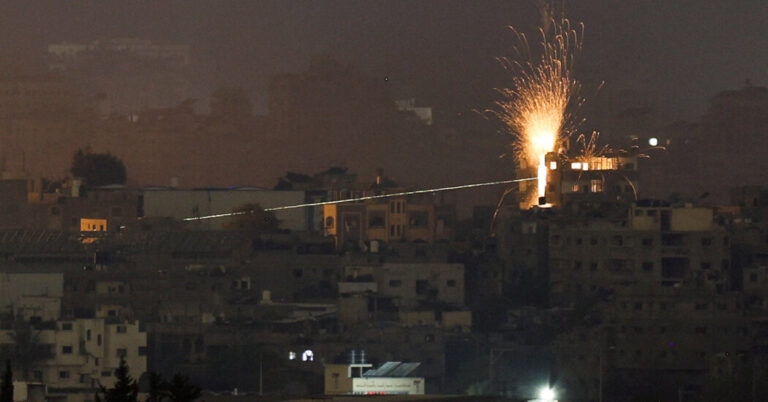As the Israeli military has stepped up pressure on what it calls Hamas’ last bastion in Gaza, Sunday’s fighting elsewhere in the Palestinian enclave prompted warnings that the militants could remain a force for a long time .
Close ground fighting between Hamas fighters and Israeli troops raged in parts of northern Gaza over the weekend, both sides said on Sunday, even as the world’s attention was largely focused on the southern town of Rafah, where Israel intensified its military operations last week.
It has become a familiar scenario in the Gaza Strip over the course of the seven-month war: After pitched battles, Israel declares an area clear of Hamas, only to return once the militants have rebuilt their forces.
Secretary of State Antony J. Blinken on Sunday expressed concern that Israel’s failure to establish a model for Gaza governance meant its victories may not be “sustainable” and would be followed by “chaos, anarchy and finally by Hamas again. »
Mr Blinken’s warning comes as the Israeli military said its soldiers had “eliminated a number” of fighters in the Zeitoun neighborhood of Gaza City. In the nearby town of Jabaliya, where civilians were ordered to evacuate on Saturday, troops moved in overnight after warplanes struck more than two dozen targets, the military said. The operation, he said, was “based on intelligence information regarding Hamas’ attempts to regroup.”
Hamas said on Sunday that its fighters were engaged in “fierce clashes” with Israeli soldiers near Jabaliya and that fighters fired large-caliber mortar shells at Israeli forces in Zeitoun.
None of these claims could be independently verified.
Palestine TV, a channel affiliated with the Palestinian Authority, a rival to Hamas based in the Israeli-occupied West Bank, broadcast images showing, it said, civilians, many of them women and children, fleeing northern Gaza. Some were on foot, while others were on bicycles, in cars or crowded onto donkey carts.
“I am deeply distressed by the rapid deterioration of living conditions in Gaza,” said Volker Türk, the United Nations human rights chief. A declaration on the fighting in the north.
In Rafah, the southernmost city where more than a million Palestinians have fled for safety since the war began in October, Gazans were on the move again, fearing Israel would move in in force in the city.
Israel is under intense international pressure – notably from the United States, its closest ally – not to launch a full-scale invasion of Rafah. Israelis say they are determined to eradicate the militants who carried out the October 7 attacks on Israel.
But the main leaders of Hamas in the Gaza Strip, notably Yahya SinwarThere is no intelligence hiding in Rafah, according to U.S. officials, that could undermine the Israeli justification for major military operations in the city.
U.S. officials say Israeli intelligence agencies agree with the U.S. assessment. Intelligence agencies in both countries believe that Mr. Sinwar most likely never left the network of tunnels beneath Khan Younis, a major northern city, according to U.S. officials. The U.S. officials spoke on condition of anonymity to discuss sensitive intelligence assessments.
Israel nevertheless increased pressure on Rafah.
The main United Nations agency helping Palestinians in Gaza said Sunday morning that around 300,000 people had fled Rafah over the past week. Another organization, the World Food Program, warned that a full-scale invasion of the city would be “catastrophic.”
Gaza’s largest telecommunications company said on Sunday that internet service was interrupted in parts of southern Gaza due to Israeli military operations. And Doctors Without Borders said it had begun diverting the last 22 patients from one hospital, Indonesia’s Rafah field hospital, to other facilities because it could “no longer guarantee their safety.”
On Sunday, Israeli citizens celebrated Memorial Day, a day of national mourning that took on an even more poignant dimension this year. At 8 p.m., a minute-long siren sounded across the country, bringing pedestrians and traffic to a standstill.
Even in a normal year, commemorating soldiers and victims of terrorist attacks is sacrosanct in Israel, a small country where many know people killed or injured as a result of the years-long Israeli-Palestinian conflict. decades.
Around 1,200 people were killed and 250 taken hostage on October 7, according to Israeli authorities. Since Israel launched its invasion of Gaza, at least 272 soldiers have been killed, according to the army. More than 34,000 Palestinians have been killed in the war and most Gazans have been forced to flee their homes, according to Gaza officials.
Liam Pile reported from Tel Aviv, Aaron Boxerman from Jerusalem, and Eric Nagourney from New York. The report was provided by Julian E. Barnes, Adam Entous And Mike Ives.


